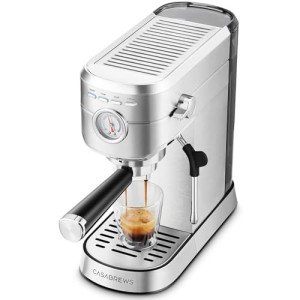The Reasons To Work On This Energy-Efficient Espresso Machines
Energy-Efficient Espresso Machines: A Comprehensive Guide
In the world of coffee lovers, espresso machines are typically concerned as necessary devices for brewing abundant, fragrant coffee. However, the energy intake connected with these machines can lead to increased utility bills and environmental issues. As customers become more eco-conscious, energy-efficient espresso machines have emerged as a popular option. This short article intends to explore the functions, benefits, and alternatives available in energy-efficient espresso machines, helping coffee enthusiasts make informed choices.
What Makes an Espresso Machine Energy-Efficient?
Energy-efficient espresso machines are developed to lessen energy consumption while keeping optimum efficiency. A number of features contribute to the energy efficiency of these machines:
Insulation: High-quality insulation helps keep heat, minimizing the energy required to preserve ideal brewing temperatures.
Smart Technology: Many modern machines are geared up with programmable settings that permit users to arrange brewing times and change to standby mode when not in use.
Quick Heat-up Time: Energy-efficient espresso machines frequently use innovative heating innovations, such as thermoblocks or PID controllers, to heat water rapidly.
Low Wattage: Machines that run at lower wattages consume less energy in general, making them more efficient.
Car Shut-off: Automatic shut-off features guarantee that the machine shuts off after a specific duration of lack of exercise, more reducing energy waste.
Advantages of Energy-Efficient Espresso Machines
Buying an energy-efficient espresso machine can use a number of advantages:
Cost Savings: Over time, lower energy usage can result in lowered electrical power bills.
Ecological Impact: Using less energy lowers carbon footprints, making these machines a more sustainable option for ecologically conscious customers.
Enhanced Performance: Many energy-efficient designs also offer exceptional developing innovations, leading to better-tasting espresso.
Resilience: Typically, energy-efficient machines are constructed with high-quality elements, causing greater durability.
Features to Consider
When picking an energy-efficient espresso machine, several functions ought to be considered:
- Type of Machine: Options include manual, semi-automatic, and totally automatic designs, each with varying degrees of user control and automation.
- Brew Quality: Look for machines that use high-quality developing systems to guarantee optimal taste extraction.
- Upkeep: Some machines have self-cleaning functions that can save energy and effort in upkeep.
- Capacity: Depending on individual or household size, machine capability can affect energy intake, with larger machines typically requiring more power.
Popular Energy-Efficient Espresso Machines
The marketplace offers a range of energy-efficient espresso machines dealing with different needs and choices. Below are some notable models:
Brand
Design
Key Features
Energy Consumption
Breville
Barista Express
Integrated grinder, PID temperature level control, quick heat-up.
Low
DeLonghi
EC155
Compact size, simple to use, long lasting develop.
Moderate
Rancilio
Silvia
Heavy-duty style, outstanding temperature stability, and has a low environmental impact.
Moderate
Gaggia
Timeless
Trustworthy manual operation, resilient brass components, and effective steaming ability.
Low
Jura
E8
Totally automatic, smart functions, and a detachable brew group for simple cleansing.
Low
Tips for Optimal Energy Efficiency
Aside from picking an energy-efficient model, customers can embrace several practices to make the most of energy effectiveness:
- Preheat: If your machine has a preheating function, use it to make sure that the optimum temperature is reached quickly before brewing.
- Shut off After Use: Always turn off the machine after brewing or make use of machines with vehicle shut-off features.
- Routine Maintenance: Keep the machine well-kept to guarantee it runs efficiently and effectively.
Frequently Asked Questions About Energy-Efficient Espresso Machines
1. Are energy-efficient espresso machines more expensive?
While the initial financial investment might be higher for energy-efficient models, the long-term savings on electricity expenses can balance out the preliminary cost. Additionally, lots of energy-efficient machines come with innovative features that improve the developing experience.
2. How do I understand if an espresso machine is energy-efficient?
Look for indicators such as Energy Star certification, user reviews, and specs regarding wattage and heat-up time. Machines with particular functions focused on minimizing energy usage are typically created for better effectiveness.
3. Can I use an energy-efficient espresso machine for other coffee styles?
Numerous energy-efficient espresso machines provide flexibility, allowing users to brew different coffee designs beyond espresso, such as lattes and cappuccinos, by integrating steaming abilities.
4. Do energy-efficient designs sacrifice quality for effectiveness?
Not necessarily. read review -efficient espresso machines are equipped with high-quality developing technology that can boost flavor extraction while lowering energy consumption.
5. What maintenance is needed for energy-efficient espresso machines?
Routine maintenance includes cleaning up the machine, descaling when essential, and occasionally examining seals and gaskets to ensure optimum performance and energy effectiveness.
Energy-efficient espresso machines represent an ideal blend of efficiency, savings, and ecological responsibility. By thinking about various functions, benefits, and brand names, customers can choose a model that matches their unique preferences while contributing favorably to the environment. As the pattern towards sustainable living grows, the popularity of energy-efficient home appliances, consisting of espresso machines, is most likely to continue its upward trajectory, providing coffee lovers a guilt-free method to enjoy their daily dose of espresso.
